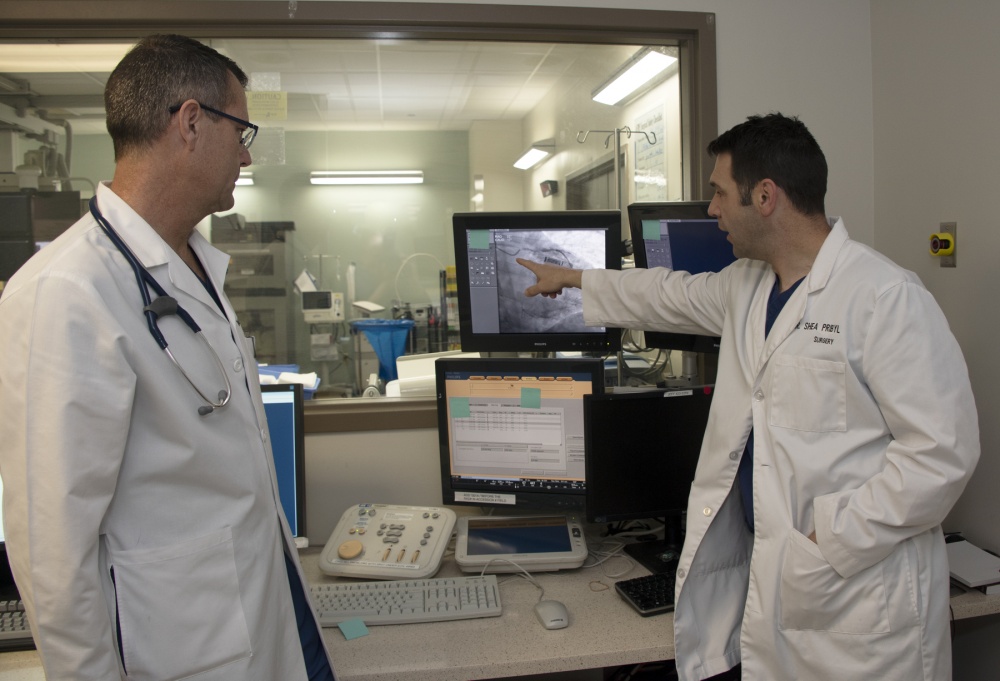Cardiology Clinic

About Us
Welcome to the Cardiology Clinics, caring for your heart with the full complement of cardiovascular services. At Madigan Army Medical Center Cardiology, we are proud to offer comprehensive state of the art cardiovascular care to our patients. We have an experienced team of staff cardiologists, nurse practitioners, nurses, and cardiovascular technologists working together to provide the highest quality care to our patients. We take care of the full range of cardiovascular conditions, and are the regional military tertiary referral center for complex cardiovascular patients.
We offer comprehensive noninvasive testing to include exercise stress testing, stress echocardiography, coronary CT angiography, transthoracic echocardiography and holter/event monitoring. Invasive testing includes cardiac catheterization with implantation of coronary stents, device implantation (pacemakers, defibrillators), transesophageal echocardiography, and cardioversion procedures. We also refer patients who require surgical interventions (such as coronary bypass surgery, valve surgery) to our Cardiothoracic Surgery team.
The Cardiac Catheterization Laboratory
The Cardiac Catheterization Laboratory at Madigan Army Medical Center performs state-of-the-art invasive diagnostic and therapeutic procedures to address a wide range of cardiac conditions. Our lab is staffed by a team of professionals on call 24 hours a day to quickly respond to any emergencies that may occur. We work closely with Cardiothoracic Surgery, Vascular Surgery and Interventional Radiology. Here are just some of the therapies that we offer and perform here at the Madigan catheterization lab:
Cardiac Catheterization
During a cardiac catheterization, a small catheter (or tube) is threaded through your blood vessels to the heart or vital organs. Using X-rays and injecting a contrast agent, we can diagnose conditions such as blockages in your coronary arteries from cholesterol plaques or life-threatening blood clots. Pressures in the different chambers of the heart can be measured and analyzed.
Angioplasty and Stenting
Should cardiac catheterization reveal that there are blockages in the coronary arteries that require treatment, angioplasty and stenting can be performed. During angioplasty, a small balloon is inflated inside the blockage, opening up the vessel and restoring blood flow to the heart muscle. Stenting involves the insertion of a metal mesh tube (called a stent) to re-establish normal blood flow and to keep the vessels open. Sometimes, the interventional cardiologist may choose a stent coated with special medication which can help prevent excessive scar tissue from building up inside the stent, thereby improving long-term results.
Fractional Flow Reserve
If a person has a blockage in one of their coronary arteries that does not clearly limit blood flow (such as a >70% narrowing), FFR can help determine if further treatment with stenting is necessary. A sensitive wire is carefully threaded across the blockage. If a major change in pressure is detected, then a stenting procedure may be necessary. If the pressure is little changed, then a stent may be avoided.
Intravascular Ultrasound
A tiny ultrasound probe is maneuvered down the blood vessel and pictures of the vessel are taken from the inside. This can help better diagnose certain conditions, such as tears in the vessel wall, and the amount of blockage within an artery. It can also help the interventional cardiologist place stents and evaluate the result in real time.
Thrombectomy/Atherectomy
Some blockages in the coronary arteries are soft and due to blood clots. These can be aspirated (extracted) via a tiny vacuum tube that is advanced down the vessel. This is known as “aspiration thrombectomy”. Other blockages are very hard due to calcium buildup, and cannot be opened with a balloon. We can use a Rotablator device, which is a tiny diamond-tipped drill, to cut through the plaque and restore blood flow or a catheter with a LASER at the tip to enhance our ability to successfully treat symptomatic blockages.
Cardiac Assist Devices
In the critically ill patient, medications alone may not be enough to support adequate blood flow. The Intra-aortic Balloon Pump, may be inserted into the main blood vessel just outside the heart, and can provide support in critical situations.
Atrial Septal Defect/Patent Foramen Ovale Closure
Some patients are born with a defect, or hole, in the atrial septum. This is a thin wall which separates the right upper chamber of the heart from the left upper chamber. Sometimes, this can result in an abnormal pressure buildup in the right side of the heart. It can also result in abnormal heart rhythms, permanent changes in the heart’s size, heart failure and stroke. In some cases, these defects can be closed without open heart surgery, via an IV placed in the leg. We use the Amplatzer Septal Occluder system to manage patients with ASD/PFO who are at risk for these complications.
Pacemakers
Our cardiac device service provides pacemaker and implantable cardiac defibrillator insertion.
Peripheral Vascular Disease
The buildup in plaque inside blood vessels which supply the arms, legs, brain and other organs can result in a variety of conditions, such as pain in the legs with walking (claudication), ulcers of the legs and feet (critical limb ischemia), and decreased oxygen to the brain (stroke). We work in concert with Vascular Surgery to offer a variety of services for patients with suspected PVD, including angiography, angioplasty, and stenting.
Who can be seen here?
Patients seen in the Cardiology Clinic are those referred from their primary care provider.
Directions
The Madigan Cardiology Clinics are located in Madigan Army Medical Center and can be reached by taking I-5 Exit 122 and turning onto Beaumont Avenue into the Medical Mall Purple Parking Lot. The Cardiology Clinics are located on the second floor of the Medical Mall.